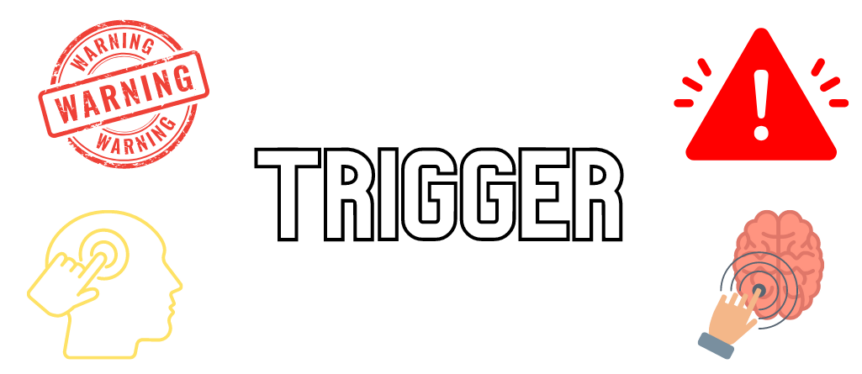Do you sometimes get triggered and get upset about certain people or situations in your life? Being triggered is often met with reservations and discomfort. Many of us find it unpleasant and believe it would be better to avoid such triggers. However, what if I assure you that being triggered is not only good but also healing? Let’s delve deep into this often-misunderstood phenomenon and explore why it plays an essential role in our personal development and emotional healing.
1. Self-Reflection and Awareness: Discovering Your Inner World
Being triggered is like an invitation to connect with your deepest self. The moment you realize it goes beyond the external situation, awakening inner emotions and reactions, you gain a better understanding of your responses and fears. Reflecting on why certain things trigger you not only enhances your self-awareness but also opens the opportunity for active self-improvement. It’s peeling the layers of your personality and gaining a deeper awareness of your own emotions.
2. Emotional Processing and Healing: Cleansing Old Wounds
Being triggered is akin to a cleansing storm for your soul. It confronts you with deeply rooted emotions from the past that may have slumbered beneath the surface for a long time. Though the process can be painful, it allows for conscious processing and paves the way for emotional healing. It’s as if you’re cleansing your inner wounds to make room for new emotional well-being. Allowing yourself to heal old scars and free yourself from emotional baggage.
3. Strengthening Mental Resilience: Fortifying Mental Muscles
Life is a sequence of challenges, and being triggered is one of them. By consciously exposing yourself to such situations, you strengthen your mental resilience. Similar to physical training where muscles are strengthened through resistance, overcoming trigger situations fortifies your mental strength. You learn to deal with difficult moments and assert yourself despite emotional unrest. It’s like training your inner warrior to emerge stronger from every battle.
4. Expanding the Comfort Zone: Growth Through Challenge
Personal development often occurs outside the comfort zone. Being triggered provides an opportunity to consciously seek situations that challenge you. It may be uncomfortable, but therein lies the potential for personal growth and deeper self-discovery. Stepping into the unknown, exploring new facets of your personality, and shaping yourself into a stronger, more resilient version.
5. Fostering Empathy: Deeper Understanding of Others
Being triggered not only deepens your understanding of yourself but also of others’ feelings. Experiencing how certain topics or actions evoke strong emotional reactions makes you more sensitive to the emotions of those around you. This creates a deeper connection with people as you learn to respect and appreciate the emotional highs and lows of others, understanding the complexity of human emotions through personal experience.
6. Promoting Communication and Understanding: Clarity in Relationships
Awareness of your triggers improves not only self-knowledge but also your communication skills. Understanding what triggers you allows for clearer communication, minimizing misunderstandings in interpersonal relationships. It enables you to communicate needs and boundaries openly, leading to healthier and deeper connections with others. You become a more conscious and empathetic communicator who can understand subtle nuances between the lines.
7. Personal Development and Growth: The Art of Change
Being triggered often serves as a wake-up call for personal growth, signaling that you’re at a point in your life where change is possible. These challenges offer an opportunity to transcend yourself and make positive changes in your life. It requires courage to face these trigger situations, but the positive impacts on your emotional well-being and personal growth are worthwhile. Recognizing that the art of change involves confronting life’s discomforts and emerging strengthened.
8. Acceptance and Letting Go: Finding Inner Peace
Being triggered forces you to confront the unpleasant. This process can lead you to learn to accept things you cannot change and simultaneously learn to let go. It’s a step toward inner peace, allowing you to free yourself from emotional baggage. You recognize the liberating power of acceptance as you learn to shed burdens and create space for positive changes in your life.
The Duality of Triggers: Positive and Negative
It’s crucial to emphasize that triggers can be both positive and negative. Positive triggers can motivate us to excel and evoke deep joy. They spark creativity and meaningful connections with others. On the flip side, negative triggers remind us of painful experiences and can provoke strong emotional reactions. The key is to recognize both types of triggers, understand their effects, and deal with them constructively. This conscious handling of triggers enables balanced emotional development and promotes long-term mental health.
In Conclusion:
Being triggered is not only an unpleasant experience but also an opportunity for personal development and healing, provided you pay close attention to why you are triggered and what causes your emotional reactions. Whether it’s your morals, upbringing, or a clash with your worldview, facing these trigger situations requires courage. The positive effects on your emotional well-being and personal growth are worth it. Take a closer look, be willing to confront yourself, and embark on the transformative journey of self-discovery. You’ll be surprised at the strength and healing hidden in these seemingly challenging moments. Being triggered is not just a confrontation with the unknown but an invitation to discover the deep treasures of your own soul.

